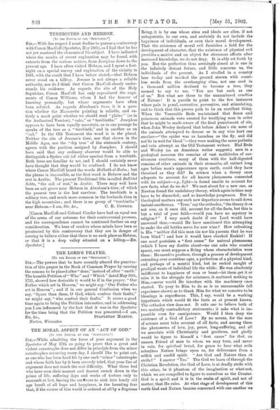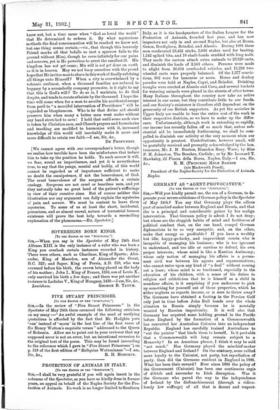THE MORAL ASPECT OF AN " ACT OF GOD."
(TO THE EDITOR OF THE "SPECTATOR:] SIR,—While admitting the force of your argument in the Spectator of May 17th as going to prove that a great and violent catastrophe does not differ in principle from the minor catastrophes occurring every day, I should like to point out, as one who has been hard hit by one such "minor" catastrophe and whose faith has by it been severely tried, that your line of argument does not touch the real difficulty. What those feel who have seen their nearest and dearest struck down in the prime of life, suffering days and weeks of torture only to succumb at last, leaving the sur*ivom to sink into lonely old age bereft of all hope and happiness, is the haunting fear that, if the course of this world is ordered at all by a Supreme Being, it is by one whOse aims and ideals are alien, if not antagonistic, to our own, and certainly do not include the happiness of individuals, or even their moral development, That the existence of moral evil furnishes a field for the development of character, that the existence of physical evil provides a motive and an object for strenuous efforts after increased knowledge, we do not deny. It is ably set forth by you. But the perfection thus seemingly aimed at is one in the infinitely distant future, and little concerns us, the individuals of the present. As I strolled in a country lane to-day and marked the ground strewn with count- less seeds from the overhanging elms, not one seed in a thousand million destined to become a tree, they seemed to say to me, " You are but such as one of us." But what are these to the unnumbered cruelties of Nature ! It is puerile to point to the few instances where pain is penal, corrective, preventive, and stimulating, and to think that this proves pain to be an excellent thing. When the Venerable Bede maintained that fierce and poisonous animals were created for terrifying man in order that he might be made aware of the final punishment of sin, when John Wesley declared that before Adam's sin none of the animals attempted to devour or in any wise hurt one another—" the spider was as harmless as the fly, and did not lie in wait for blood "—they were making the same pathetic and vain attempt as the Old Testament writers. Had Bede and Wesley (as an American writer suggests) seen in a geological museum the remains of vast multitudes of car- nivorous creatures, many of them with the half-digested remains of other animals in their stomachs, all extinct long ages before man's appearance upon earth, could they have theorised as they did? In science when a theory once adequate to account for all known phenomena connected with its subject—e.g., light—is found unable to account for new facts, what do we do ? We cast about for a new one, as Newton found the undulatory theory, which again in time may have to be discarded; and so knowledge progresses. But in theological matters any such new departure seems to call down instant anathemas. " True," say the orthodox, " the theory does not now, as it once did, account for all the facts, but this is but a trial of your faith—would you have no mystery in religion ? " I very much doubt if our Lord would have answered thus,—would He have sanctioned this attempting to make the old bottles serve for new wine ? How refreshing is His "neither did this man sin nor his parents that he was born blind " ! and how it would have shocked Ezekiel ! If one must postulate a " first cause" for natural phenomena (which I have my doubts about—no one asks who created space), one must suppose a Being whose characteristics were these : He cared to produce, through a process of development extending over countless ages, a perfection of a physical kind, and perhaps of a mental kind, but he reeked naught of prodigal waste of individual life the while : He was absolutely indifferent to happiness of man or beast—let them get it or miss it in the struggle for existence, it mattered nothing to Him,—never would He interfere with the machinery once started. To pray to Him to do so is as unreasonable (all experience shows) as to thank Him for what we conceive to be blessings is superfluous. This, I say, would be a working hypothesis which would fit the facts as at present known. The orthodox view does not. It asks one to believe both of two mutually contradictory statements ; it asks what is im- possible even for omnipotence. Would I then deny the existence of a God of Love ? By no means, for the man of science must take account of all facts, and among them the phenomena of love, joy, peace, long-suffering, and all we associate with Christianity and goodness, and gladly would he figure to himself a "first cause" for that, an unseen Friend of man to whom we may turn, and never in vain, for spiritual bread, for grace to bear what evils relentless Nature brings upon us, for deliverance from a selfish and sordid spirit. " Are God and Nature then at strife P " I answer "Yes." The God we learn of through the Christian Revelation, the God of Love, is at deadly strife with this other, be it phantom of the imagination or what-not, which we are compelled to figure to ourselves as the. Creator. God is a spirit, and it is in the realm of spirit, and not of matter, that He rules. At what stage of development of this earth God and Nature became concerned with one another we know not, but a time came when " God so loved the world" that He determined to redeem it. By what mysterious methods the final consummation will be reached we know not, but one thing seems certain,—viz., that though this heavenly Friend marks all that befalls us (not a sparrow falls to the ground without Him), though he cares infinitely for our pains and sorrows, yet is He powerless to avert the smallest ill. His kingdom has not yet come; His will is not yet done on earth as it is in heaven. May we not buoy ourselves with the proud hope that He invites man to share in this work of finally subduing all things unto Himself ? When a city is overwhelmed by a volcanic outburst, when a thousand families are reduced to beggary by a scoundrelly company promoter, is it right to say that this is God's will ? To do so is, I maintain, to do God despite, and tends to create atheists by the thousand. I hope the time will come when for a man to ascribe his accidental escape from peril to "a merciful intervention of Providence" will be regarded as blasphemous. Who is he that divine aid should preserve him when many a better man went under without any band stretched to save ! I hold that until some such view is taken by Christian men, and Church prayers and formularies and teaching are modified to harmonise with it, increased knowledge of this world will inevitably make it more and more difficult to retain our faith.—I am, Sir, &c.,
DE PROFIINDIS.
[We cannot agree with our correspondent's letter, though we realise how terrible have been the misfortunes that induce him to take up the position he holds. To such sorrow it will, we fear, sound an impertinence, and yet it is nevertheless true, to say that the pangs, mental and bodily, of this world cannot be regarded as of importance sufficient to make us doubt the omnipotence, if not the benevolence, of God. The cruel benevolence of the surgeon affords a certain analogy. Surgeons are not cruel or heartless men, and yet they naturally take no great heed of the patient's sufferings in view of their curative aims. But of course neither this illustration nor any argument can fully explain the mysteries of pain and sorrow. We must be content to leave them mysteries. To some of us at least the short, incidental, precarious, and so almost unreal, nature of terrestrial human existence will prove the best help towards a reconciling explanation of the phenomena.—En. Spectator.]











































 Previous page
Previous page